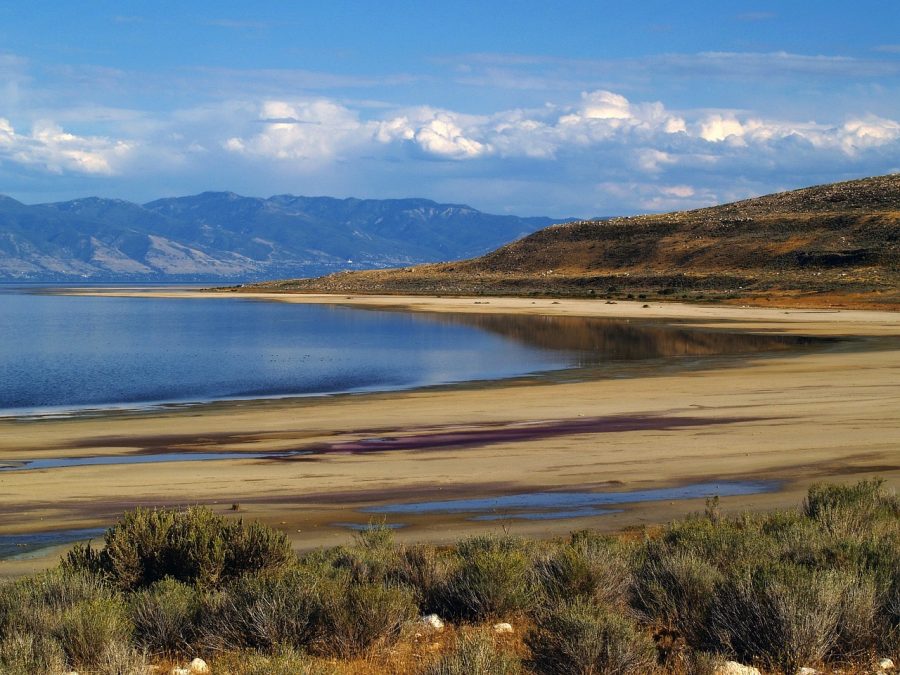Don’t Let The Great Salt Lake Dry
When flying into Salt Lake City, it is impossible to miss the unique beauty of the Great Salt Lake. The waters of the lake create a dreamlike mirror of the sky, which is peppered by islands with craggy mountain tops. Although a natural wonder as large as the Great Salt Lake would seem permanent, it is not. In recent years, the lake has been rapidly drying up due to climate change and population growth in the region. The situation is so dire that a study from Brigham Young University predicts the lake could become completely dry in five years. If that happens, toxic dust particles containing arsenic and mercury would contaminate the air of the Wasatch Front and poison the lungs of Salt Lake City citizens. As a former resident of Salt Lake City, the recent news has left me gravely concerned and upset. You never want to read that your former home may become an environmental disaster. That is why I plead to Utah lawmakers to enforce water use restrictions to allow the Great Salt Lake to grow again.
It is important to look at the lake’s ecosystem services for the region to fully appreciate its impact. The lake provides an important resting place for birds on migration paths. Utah’s famous snow exists because of the “lake effect” from the lake’s moisture that leads to storms dumping more snow. The region also benefits economically from the deposits of lithium, magnesium and other minerals near the lake. Since the lake is drying up, all these benefits are at risk of disappearing.
Many experts are worried that the region could end up in the same position as Owens Lake in California. When Los Angeles rapidly expanded in the early 20th century, it took action to divert water from the Owens river to the city for drinking water. Before Los Angeles’s actions, Owens Lake was a picturesque town. However, the river’s diversion caused the lake to dry up and become the source of poisonous dust storms. The town sued Los Angeles and won. Since becoming responsible for managing the dry lake’s dust, Los Angeles has spent $2.5 billion. Nevertheless, all that money will never restore the lake and town to its original condition.
What can be done to solve this crisis? Some Utah politicians have proposed absurd solutions, like building a pipeline to connect the lake with the Pacific Ocean. The most common sense action is a lot simpler, and it would be for the state to encourage less water usage from its citizens. Although Salt Lake City is in the middle of a desert, it is home to the country’s cheapest water per gallon usage. If the city increased the water costs, it would mean less water usage by its residents. Neighborhood HOAs also contribute to water waste by making residents water their lawns for curbside appeal. A law banning HOAs from implementing this rule would save even more water usage. However, it would be a lie to say that this simple solution would be easy to implement. A large amount of water is used for farming plants like alfalfa, and many local politicians are worried about hurting that industry. The state’s lawmakers know that they have to do something to save the lake, but they are too afraid to take any action that would upset anyone.
The state has changed a lot since I moved away in 2011. During the 2010s, Utah had a growth rate of 17.6%, which was the largest in the country. Sand lots I drove by as a kid are now fully-built neighborhoods. In many ways, this growth has brought a lot of good to the state. But the harsh reality is that the region has been hugged to death. The growing usage of Salt Lake City’s water supply has caused worries about demand exceeding growth in the 2040s. If the state’s politicians had allowed for population growth to happen in a more manageable way with as much concern for water usage for its citizens as its farmers, then Utahns would not have had to deal with their current issues.
Like many past and present residents of Utah, I have many positive memories associated with the lake. My family went on many camping trips to Antelope Island State Park at the lake during my childhood. The rugged and quiet beauty of the lake gifted me with a love of the outdoors that has lasted my whole life. Now that the Great Salt Lake is on the precipice of death, I hope lawmakers in the state decide to let go of their fear of upsetting farmers and enforce water restrictions. If the waters are allowed to flow freely, the lake can be reborn and a new generation of Utahns can gain a love of nature from it.
Evan McManus, FCRH ’25, is a political science major from Dover, Mass.

Evan McManus is a senior from Dover, Mass., majoring in political science and minoring in communications. As a sophomore, he started writing for The Fordham...










































































































































































































